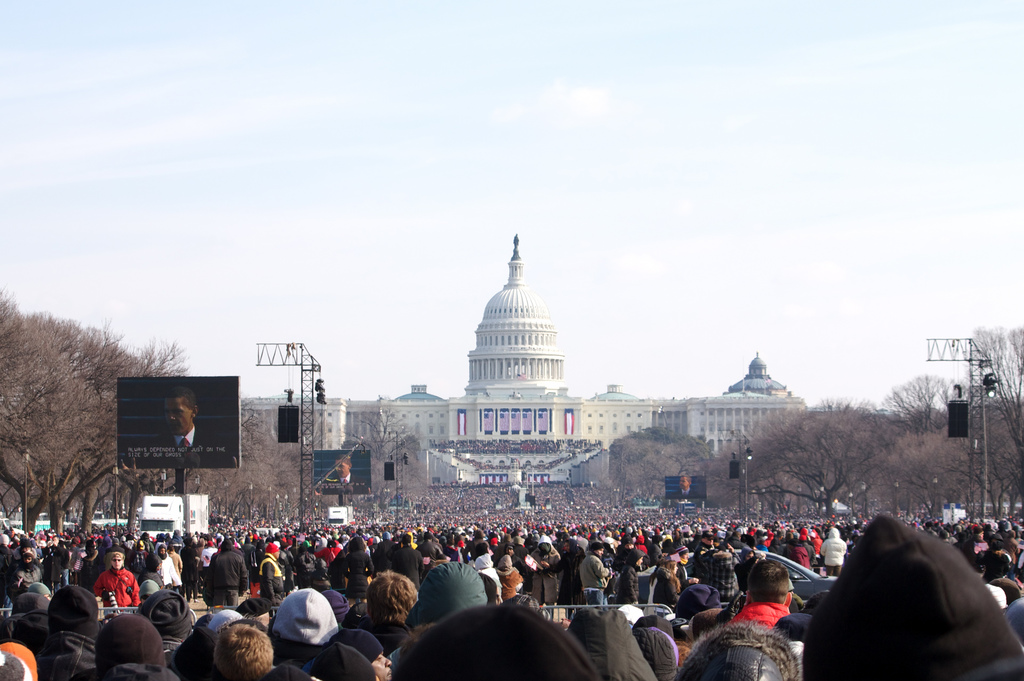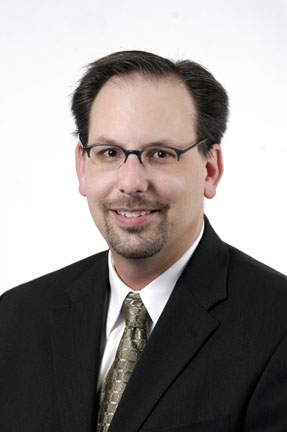
Barack Obama faced singularly high expectations for his inaugural address, after a campaign full of inspired speeches. Below, Gerhard Peters, the co-founder and co-director of the American Presidency Project, discusses what makes a good inaugural speech, how Obama fared, and whether he pulled off the sort of line – like John Kennedy, Franklin Roosevelt, and Ronald Reagan before him – that will be remembered for decades to come.
Q. What were your initial thoughts about Obama’s address? What did you find unusual or particularly memorable about it?
A. I didn’t find anything particularly unusual about it, other than the fact that Chief Justice Roberts blew the oath. And for those skeptics, it was the Chief Justice that mixed the words!
My first reaction yesterday was that it was a very, very good speech. I didn’t initially put it in the category of the great inaugural addresses, and those are few. I didn’t see at first a very memorable line, like John F. Kennedy’s “Ask not what your country can do for you – ask what you can do for your country,” or Ronald Regan saying “Government is not the solution to our problem; government is the problem,” which epitomized the Reagan era that ended at noon yesterday, or even Roosevelt’s “the only thing we have to fear is fear itself.”
But sometimes you have to let these things sink in. There were a number of themes that I think will be very memorable, some of which a lot of observers haven’t fully come to appreciate. It might be many years before we come to appreciate it. There was one thing late in the address, when Obama addressed the Muslim world: “we seek a new way forward, based on mutual interest and mutual respect.” That was certainly memorable since it recognizes that within the diversity of the Muslim world, we can indeed find common ground.
He later said to the people of poor nations, “we pledge to work alongside you to make your farms flourish and let clean waters flow; to nourish starved bodies and feed hungry minds.” Next, he said, “And to those nations like ours that enjoy relative plenty, we say we can no longer afford indifference to the suffering outside our borders, nor can we consume the world’s resources without regard to effect. For the world has changed, and we must change with it.” That is a very, very powerful sentence.
Q. Will that line be the one we remember, like Kennedy’s and Roosevelt’s, and if so, why?
 A. What defines the 21st century, and what I think people in 60 or 70 years looking back would recognize, is not 9/11, it’s not the war on terror, which will hopefully be resolved within this generation. What’s going to define the century is the scarcity of resources. Wars and cooperation between nations will center around water, energy, and basic natural resources. We already see those strains beginning. Take China and India. These are countries with more than a billion people each, with educated populations that are developing a middle class. And frankly with that is going to come demands for resources: clean water, automobiles, and the energy required to run those automobiles. Look at what we consume with 300 million people. Take a nation like India, with a billion people. Even if 500 million achieved a lifestyle similar to ours, that’s going to put a huge demand on resources.
A. What defines the 21st century, and what I think people in 60 or 70 years looking back would recognize, is not 9/11, it’s not the war on terror, which will hopefully be resolved within this generation. What’s going to define the century is the scarcity of resources. Wars and cooperation between nations will center around water, energy, and basic natural resources. We already see those strains beginning. Take China and India. These are countries with more than a billion people each, with educated populations that are developing a middle class. And frankly with that is going to come demands for resources: clean water, automobiles, and the energy required to run those automobiles. Look at what we consume with 300 million people. Take a nation like India, with a billion people. Even if 500 million achieved a lifestyle similar to ours, that’s going to put a huge demand on resources.
What Barack Obama is preparing us for is that we need to change, whether we like it or not. And that was a line that did not generate any applause, but it was memorable, and it will be one of the themes of his administration. Great presidents are usually defined by the times, and the times often provide great presidents. We don’t know whether Barack Obama will be a great president. That remains to be seen. But he does show the rhetorical ability to get us to become more responsible about what we consume, and I don’t think he would have the opportunity to be as successful at that if we weren’t going through a major recession.
Q. You mentioned that the address includes what will be themes of Obama’s administration. Is this how you would describe the purpose of an inaugural speech – to set a tone – as compared to, say, a first State of the Union address?
A. An inaugural address is definitely a unique address, definitely distinct form a State of the Union. This is an opportunity for the incoming president to set the tone and the theme of the administration, without getting into many policy details. It’s usually a summons or a call to the nation to revisit the glory of its past and to recognize what makes us exceptional…. His address was full of these themes, along with the historical nature of his own oath of office, which he expressed when he talked about how his father 60 years ago would not have been served at a restaurant.
There’s also usually some sort of summons to greatness, and a reflection on past greatness, that we can overcome adversity or achieve great things if the time is not adverse. We can expand on the prosperity we have at the time by remembering our past ideals, which Obama mentioned when he said we are a nation of many cultures and religions, and he even said “nonbelievers.” What binds us together are those elements of the American creed. You’ll also often see a reference to providence, a reference to past greatness, a summons, a call to sacrifice…. Many addresses are somber, like yesterday’s was in many ways. But the president also tries to end it with a message of hope.
Q. Did Obama strike the right tone with his call for sacrifice? Was it appropriate, too overt, or too subtle?
A. I don’t think he went too far at all. Quite the opposite. And this isn’t a criticism, but I don’t think he completed that call to sacrifice. I think he began the theme, preparing us for specific, direct calls for sacrifice that we are going to hear from him over the next year or two.
Q. How would you compare it to Kennedy’s call for service in 1961?
A. At that time, the country was mired in a recession as well, but nothing like what we’re going through now. With Kennedy, what was so significant is that it was even more of a generational change than we saw yesterday. That’s one of the themes [of Obama’s address] that people have been hammering home. He’s technically a baby boomer, but he straddles that line…. He wants nothing to do with the social debates of the 1960s. But with Kennedy, the theme was more about generational change. He was the first president born in the 20th century. He was sort of leading the baby boomer generation even though he wasn’t a baby boomer. He was calling them to national service. Their parents suffered through the Great Depression and fought World War II, then came home and built the American middle class. Their grandparents fought World War I. There was sort of a desire for young people to hear their own call to greatness…. Whereas Barack Obama’s call, even though he represents the ushering in of a new era, there is not such a stark contrast in terms of generational achievement. It’s more an issue of engagement. He’s trying to get younger people engaged.
Q. Beyond the call for sacrifice, can you discuss any of Obama’s other major themes?
A. There’s also an old debate that resurfaced in his inaugural address, and that’s the debate about the role of government, and we can directly now contrast Obama’s speech with Reagan’s and Roosevelt’s…. The New Deal era lasted from 1933 to 1981. That’s one reason why Reagan’s inaugural address was in my opinion a great inaugural address. It was that moment when he ushered in the Reagan Revolution, which ended, I believe, yesterday, 28 years later.
The term I coined for this new era in American politics is the “Obama Restoration.” It almost has a theological sound to it – since we are dealing with a president versed in civic religion. Potentially, this is to be an era where we reembrace the positive role of government in our lives. This isn’t just redoing the New Deal era. We embrace the positive role of government, but we reject the negative role. This something Clinton tried to do but wasn’t successful at, not because of any failings on Clinton’s part, but more because he was operating in the context of a strong Reagan regime – it didn’t matter that he was a Democratic president. In his 1996 State of the Union Address, he did, after all, declare that “the Era of Big Government is over.”
Barack Obama said, “What the cynics fail to understand is that the ground has shifted beneath them.” That is a very powerful use of language. He’s not alluding to the fact that he is the one changing things. He is telling the cynics that, beyond anyone’s control, there’s a tectonic political event occurring, like an earthquake.
Then he says, “The question we ask today is not whether our government is too big or too small, but whether it works, whether it helps families find jobs at a decent wage, care they can afford, a retirement that is dignified. Where the answer is yes, we intend to move forward. Where the answer is no, programs will end.” That’s restoring to the nation the idea that positive government action is beneficial…. In 1933, Roosevelt said, “…It is to be hoped that the normal balance of Executive and legislative authority may be wholly adequate to meet the unprecedented task before us. But it may be that an unprecedented demand and need for undelayed action may call for temporary departure from that normal balance of public procedure.” This is the ushering in of big federal government. Then you can see Ronald Reagan in 1981 saying no, it’s the opposite, “government is the problem.” And now you have Obama saying neither. He is saying, we need to find where government works.
*Photos courtesy ep_jhu and Gerhard Peters.




Send A Letter To the Editors